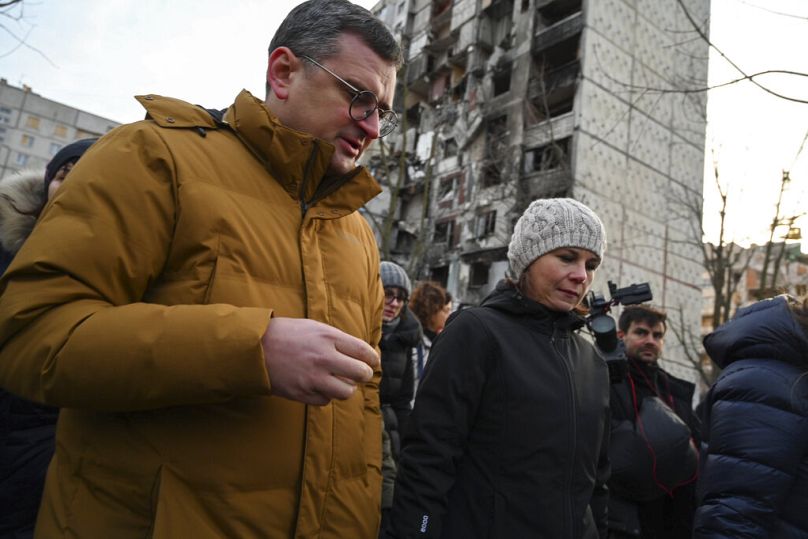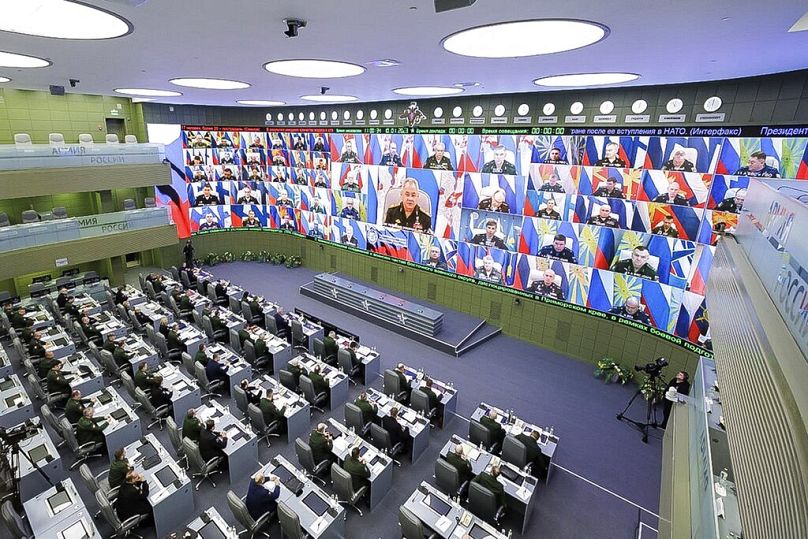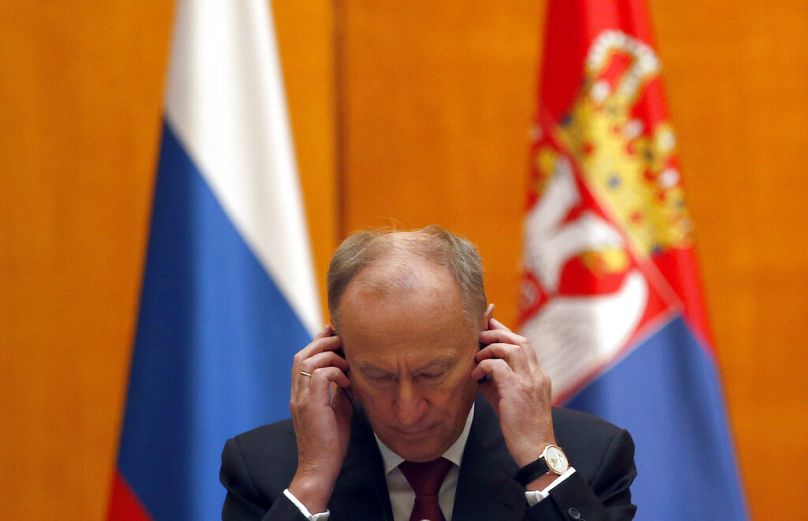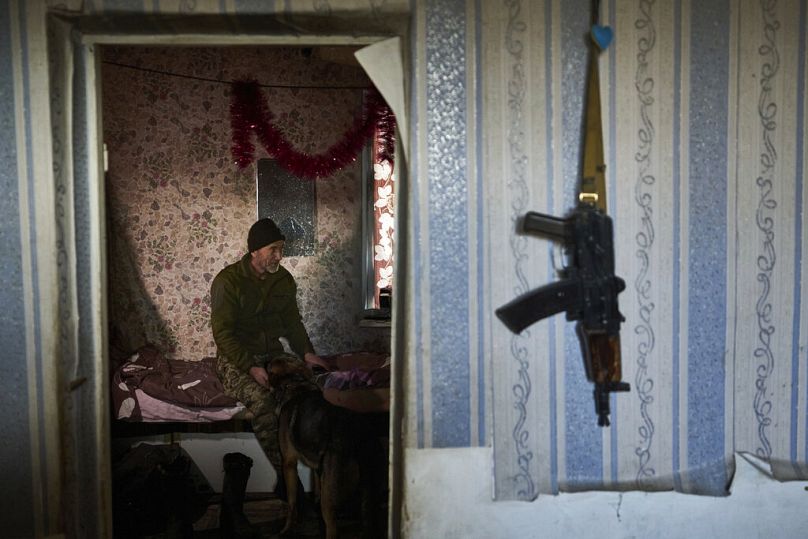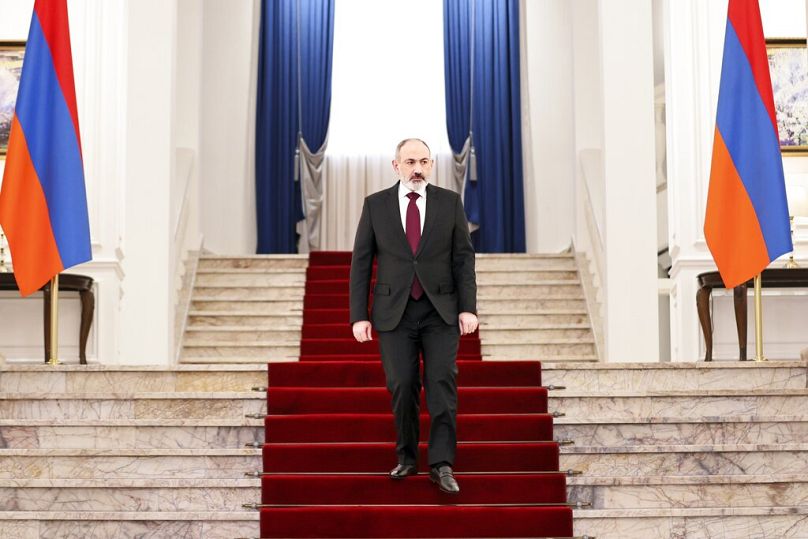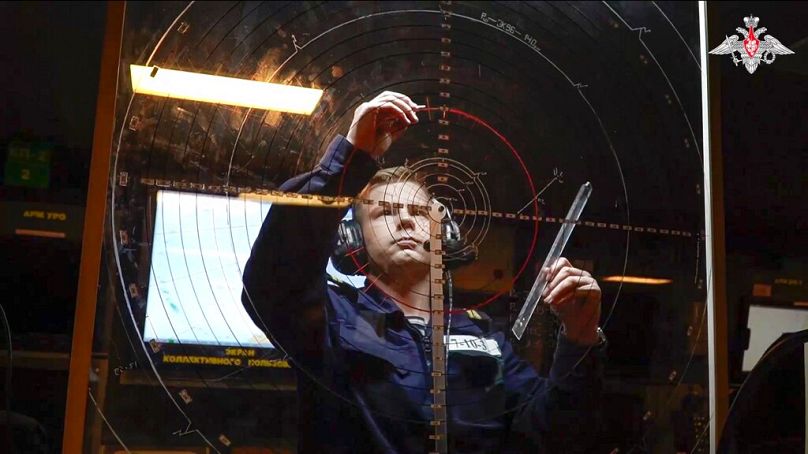Here are the latest updates from Russia's invasion of Ukraine.
1. 'Almost no life left' as Russia intensifies Bakhmut attack
Russian forces are escalating their onslaught against Ukrainian positions around the wrecked eastern city of Bakhmut, Ukrainian officials said, bringing new levels of death and devastation in the grinding, months-long battle.
 ADVERTISEMENT
ADVERTISEMENT
 ADVERTISEMENT
ADVERTISEMENT
“Everything is completely destroyed, there is almost no life left,” Ukraine’s President Volodymyr Zelenskyy said late Monday of the scene around Bakhmut and the nearby town of Soledar.
“The whole land near Soledar is covered with the corpses of the occupiers and scars from the strikes,” Zelenskyy said. “This is what madness looks like.”
The Donetsk region’s governor, Pavlo Kyrylenko, estimated more than two months ago that 90% of Bakhmut’s prewar population of over 70,000 had fled since Moscow focused on seizing the entire Donbas.
Deputy Defence Minister Hanna Malyar said Russia has thrown “a large number of storm groups” into the battle.
“The enemy is advancing literally on the bodies of their own soldiers and is massively using artillery, rocket launchers and mortars, hitting their own troops,” she said.
Russian troops, alongside soldiers from the Wagner Group, a Russian private military contractor, have advanced in recent days in Soledar and “are likely in control of most of the settlement,” the UK Defence Ministry tweeted Monday.
It said that taking Soledar -- 10 kilometres north of Bakhmut -- is likely Moscow’s immediate military objective and part of a strategy to encircle Bakhmut.
But it added that “Ukrainian forces maintain stable defensive lines in depth and control over supply routes” in the area.
An exceptional feature of the fighting near Bakhmut is that some of the fighting has been around entrances to disused salt mine tunnels, which run for some 200 kilometres underneath the area, the British intelligence report noted.
“Both sides are likely concerned that (the tunnels) could be used for infiltration behind their lines,” it said.
Taking Bakhmut would disrupt Ukraine’s supply lines and open a route for Russian forces to press on toward Kramatorsk and Sloviansk, key Ukrainian strongholds in Donetsk.
2. German foreign minister promises more weapons in surprise visit to Ukraine
Germany's Foreign Minister Annalena Baerbock made a surprise visit to the eastern Ukrainian city of Kharkiv near the Russian border on Tuesday, promising more weapons and "concrete offers" to help Ukraine join the EU.
In a statement ahead of a meeting with Foreign Minister Dmytro Kuleba, Baerbock expressed Germany's solidarity with Ukrainians living through Russia's invasion and harsh winter conditions.
"This city is a symbol of the absolute insanity of the Russian war of aggression in Ukraine and of the endless suffering that people, especially here in the east of the country, are confronted with every day," she said.
After Germany last week promised to send Marder fighting vehicles to Ukraine as part of increased military support, Baerbock promised more weapons without specifying which ones.
"In Kharkiv we can see the courage, the resilience and therefore the hope for a life in peace," Baerbock told a press conference after her arrival.
Kuleba repeated Ukraine's longstanding call for tanks and said he had no doubt that Berlin would eventually give Kyiv the coveted Leopard 2 tanks.
"I think that the German government also understands somewhere deep in its soul that this decision will be approved and the tanks will be given to Ukraine," he said.
Kuleba added that foot-dragging on the issue was costing lives but also thanked his German counterpart for the aid so far.
Baerbock also said it was important not to lose sight of Ukraine's place in Europe and its desire to join the EU.
"We as the government want to make very concrete offers to Ukraine in order to make progress in strengthening the rule of law, independent institutions and the fight against corruption, as well as in aligning with EU standards," she said.
She said Germany would provide €20 million for demining efforts and another €20m to boost Ukraine's access to Starlink internet terminals.
3. Putin appoints new ground forces commander as critics slam the choice
Russia has appointed Colonel-General Alexander Lapin as chief of staff of the country's ground forces, state-owned news agency TASS reported on Tuesday, despite fierce criticism from leading hawks over his performance in Ukraine.
Lapin, previously commander of Russia's central military district, was blasted last October by hawkish allies of Putin after Russian forces were driven out of the city of Lyman in eastern Ukraine, a key logistics hub.
His promotion -- widely reported across Russian media but neither confirmed nor denied by the Kremlin -- drew mixed reactions from the influential Russian war bloggers who often provide critical running commentary on Moscow's stuttering military effort in Ukraine.
Igor Strelkov, a former leader of pro-Russian forces in Ukraine's Donetsk region, questioned Lapin's credentials as a commander and blamed him for heavy Russian defeats last year near the city of Kharkiv. His promotion was, "to put it mildly, a misunderstanding", Strelkov wrote on Telegram on Tuesday.
Another prominent war blogger, Vladlen Tatarsky, said Strelkov was wrong to blame Lapin for the Kharkiv defeats but that his new position was a "useless" role that would duplicate the function of the General Staff.
Lapin's promotion follows other sweeping changes to Russia's military leadership during the 11-month war, in which Moscow's forces seized large areas of southern and eastern Ukraine but suffered a series of painful defeats and retreats.
On 8 October, Russia named Air Force General Sergei Surovikin as the overall commander of its forces in Ukraine, shortly after the reported sacking of the commanders of the Eastern and Western military districts.
In August, the state-owned RIA news agency reported that the commander of the Black Sea Fleet had been fired after a series of humiliations, including the sinking of its flagship Moskva and the loss of eight warplanes in an attack on a Russian base in Crimea.
After Russia lost Lyman in October, Lapin drew savage public criticism from Chechen leader Ramzan Kadyrov and Yevgeny Prigozhin, founder of the Wagner private military group, who have both sent units to Ukraine to bolster the efforts of the regular army.
Kadyrov said Lapin should be stripped of his medals and sent to the front with a gun to wash away his shame with blood.
Prigozhin backed Kadyrov's comments, saying: "All these bastards should be sent barefoot to the front with automatic guns."
4. Putin's top dog says Russia is now fighting NATO in Ukraine
One of President Vladimir Putin's closest allies said on Tuesday that Moscow was now fighting the US-led NATO military alliance in Ukraine and that the West was trying to wipe Russia from the political map of the world.
Putin casts the war in Ukraine as an existential battle with an "aggressive and arrogant" West and has said that Russia will use "all available means" to protect itself and its people.
Russian Security Council Secretary Nikolai Patrushev is seen by diplomats as one of the major hardline influences on Putin, who has promised victory in Ukraine despite a series of battlefield setbacks.
"The events in Ukraine are not a clash between Moscow and Kyiv -- this is a military confrontation between Russia and NATO, and above all the United States and Britain," Patrushev told the Argumenti i Fakti newspaper in an interview.
"The Westerners' plans are to continue to pull Russia apart, and eventually just erase it from the political map of the world," Patrushev said.
Washington has denied Moscow's claims that it wants to destroy Russia, the world's biggest producer of natural resources, while President Joe Biden has cautioned that a conflict between Russia and NATO could trigger World War III.
Russia's full-scale invasion of Ukraine in February triggered one of the deadliest European conflicts since World War II and the biggest confrontation between Moscow and the West since the 1962 Cuban Missile Crisis when the Soviet Union and the US came closest to an intentional nuclear war.
Western countries have condemned Russia's invasion of Ukraine as an imperial land grab, while Ukraine has vowed to fight until the last Russian soldier is ejected from its territory.
Patrushev said that Russia was a victim of Western designs to push it back to the borders of 15th-century Muscovy, and accused the West of bleeding Ukraine to undermine Russia.
"There is no place for our country in the West," he said.
5. EU and NATO pledge to strengthen support for Ukraine
The European Union and NATO pledged on Tuesday to provide the Ukrainians with all the military means necessary to defend their homeland, and discussions are scheduled "next week" on the types of weapons that can be provided, the leaders of the two organizations.
"Discussions are planned next week with the Ukrainians to see what kind of weapons are needed and who among the allies is able to provide them," NATO Secretary-General Jens Stoltenberg said after signing the agreement. a joint declaration with the presidents of the institutions of the EU.
These discussions will take place within the framework of the Ramstein group (the contact group on the defence of Ukraine) created by the US, he specified.
"Russia has suffered heavy losses, but it should not be underestimated. It is mobilising more troops and equipment. It is ready to suffer to continue the war. Vladimir Putin has not changed his objective and we must prepare to support Ukraine in the long term," insisted Stoltenberg.
"Ukraine must receive all the military equipment it needs to defend its territory," said European Commission President Ursula von der Leyen.
The Europeans were the first to supply military equipment to Ukraine shortly after the start of the conflict, European Council President Charles Michel said. "Military support must continue to ensure that Ukraine can defend itself", affirmed the representative of the member states.
Of the 27 member countries of the EU, 21 are also members of NATO.
Following Russia's invasion of Ukraine, the bloc's members Finland and Sweden submitted a joint application to join NATO in May.
6. Armenia refuses permission for Russian military exercises
Armenia announced on Tuesday that it would refuse to host military manoeuvres by a Russian-led alliance in 2023 amid dissatisfaction with Moscow over the blocking of a vital axis for supplying the enclave of Nagorno-Karabakh.
"Armenia does not consider it expedient to conduct Collective Security Treaty Organisation (CSTO) exercises this year ... These exercises will not take place," Prime Minister Nikol Pashinyan said during a press conference.
According to Pashinyan, Yerevan has already informed the leadership of this military alliance led by Moscow and which brings together several former Soviet republics.
He criticised the CSTO for having “refused to condemn the actions of Azerbaijan” and Russia for not playing its role of “guarantor of security” for Armenia.
“Armenia expected specific actions from Russian partners and other partners in the field of security. But it was said in Yerevan that the borders of Armenia and Azerbaijan were not not delimited", said Pashinyan.
Yerevan notably accuses Russian peacekeepers present in Nagorno-Karabakh of inaction, while Azerbaijanis have been blocking the Lachin corridor for several weeks -- a vital axis for supplying the disputed territory between the two countries.
"The Russian peacekeeping contingent must ensure the normal functioning of the Lachin corridor," Pashinyan insisted on Tuesday.
"If it suddenly turns out that Russia cannot fulfill its obligations ... it must go to the UN," he added.
Yerevan also criticised Moscow for not having played its role of mediator during violent clashes on the border between Armenia and Azerbaijan in September, when Yerevan had asked for help from the CSTO, of which it is a member.
7. Russian frigate carrying nuclear-capable missiles holds drills in Norwegian Sea
A Russian warship armed with hypersonic cruise weapons has held exercises in the Norwegian Sea, the defence ministry said on Tuesday.
"The crew of the frigate Admiral of the Fleet of the Soviet Union Gorshkov conducted an air defence exercise in the Norwegian Sea," the ministry said.
"The crew ... conducted an exercise to repel the means of an air attack of a simulated enemy in the Norwegian Sea."
Last week, President Vladimir Putin sent the frigate to the Atlantic Ocean armed with new-generation hypersonic cruise missiles, a signal to the West that Russia will not back down over the war in Ukraine.
The frigate is armed with Tsirkon missiles, which Russia says fly at nine times the speed of sound and have a range of over 1,000 km.
Russia sees the weapons as a way to pierce increasingly sophisticated US missile defences, which Putin has warned could one day shoot down Russian nuclear missiles.
Former Russian President Dmitry Medvedev last week warned the United States that the hypersonic missiles would soon be close to NATO's shores.











